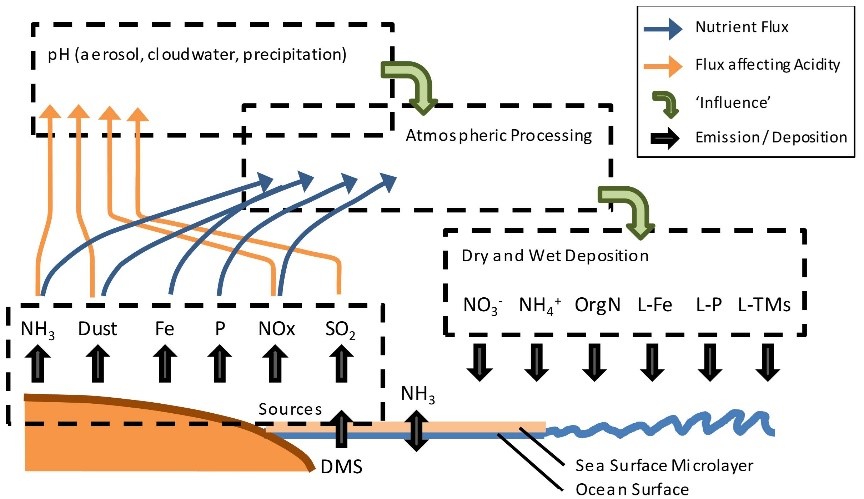Energy, Environment, Geoinformatics

Atmospheric acidity impacts oceanic ecology
Increased acidity in the atmosphere is disrupting the ecological balance of the oceans, according to new research led by the University of East Anglia (UEA).
The first study to look at acidity’s impact on nutrient transport to the ocean demonstrates that the way nutrients are delivered affects the productivity of the ocean and its ability to absorb CO2 from the atmosphere.
The research, ‘Changing atmospheric acidity as a modulator of nutrient deposition and ocean biogeochemistry’, is published today in Science Advances. The analysis was carried out byan international team of experts, sponsored by the United Nations Group of Experts on the Scientific Aspects of Marine Environmental Protection (GESAMP).

Prof Alex Baker, professor of marine and atmospheric chemistry in UEA’s School of Environmental Sciences, is the lead author. He said: “Human emissions of pollutants have caused significant changes to the acidity of the atmosphere, leading to well-known environmental impacts such as acid rain.
“Atmospheric acidity affects the quantity and distribution of nutrients (nitrogen, phosphorus and iron) delivered to the ocean.
“Acids attack the surface of desert dust particles as they are transported through the atmosphere, increasing the proportion of the phosphorus and iron contained in those particles that will dissolve when the dust falls into the ocean.
“Our work suggests that increasing acidity since the Industrial Revolution increased the proportions of phosphorus and iron that are soluble by 14 per cent and 16 per cent respectively. These increases will have had a direct fertilizing effect on marine phytoplankton.”
Over the same time period, pollutant emissions have at least doubled the amount of nitrogen added to the oceans via the atmosphere.
Prof Maria Kanakidou of the University of Crete in Heraklion, Greece, also contributed to the researchusing global chemistry transport deposition modelling. She said: “Acidity controls the distribution of nitrogen between particles and gases in the atmosphere, so that changes in acidity alter the length of time that nitrogen remains in the atmosphere and hence where in the ocean it will be deposited.”
In addition to fertilization, these changes in the amount and geographic distribution of nutrient deposition also affect the ecological balance of the ocean.
Prof Kanakidou said: “Phytoplankton communities are sensitive to the proportions of nutrients available to them. The changes in nutrient deposition that we have identified will likely have led to ecological shifts as the atmospheric input alters the nutrient balance of surface waters.These changes can promote certain phytoplankton types over others, depending on the organisms’ adaptation to the relative levels of nutrients present in the water.”
Another team member, Prof Athanasios Nenes, is from the Ecole Polytechnique Fédérale de Lausanne, Switzerland, and the Center for the Study of Air Quality and Climate Change of the Foundation for Research and Technology Hellas in Patras, Greece.
Prof Nenes said: “Fine aerosol particles tend to remain strongly acidic, despite considerable reductions in pollutants. Understanding this counter-intuitive behavior and its impact on nutrient supply to the ocean has only become possible thanks to advances in theory and modelling.”
“Anthropogenic emissions will continue to change the acidity of the atmosphere into the future. Emissions controls implemented to address acid rain will reduce aerosol acidity in many regions of the world, while continued economic development is likely to see further increases in acidity in other regions.”
The system is unlikely to return to its pre-Industrial condition, because wildfires - which influence both nutrient supply and acidity - will play a more important role in a warmer climate and the impact of this is highly uncertain.
Prof Baker said: “Knowledge of the complex interactions between nutrient supply and marine microbial communities is limited. Predictions of the consequences of long-term changes in atmospheric acidity on marine ecosystems will need to be considered alongside other stressors on the system, such as ocean acidification, warming and deoxygenation.”
The article is published 7 July 2021 in Science Advances:
Alex R. Baker, Maria Kanakidou, Athanasios Nenes, Stelios Myriokefalitakis, Peter L. Croot, Robert A. Duce, Yuan Gao, Cécile Guieu, Akinori Ito, Tim D., Jickells, Natalie M. Mahowald, Rob Middag, Morgane M. G. Perron, Manmohan M., Sarin, Rachel Shelley and David R. Turner “Changing atmospheric acidity as a modulator of nutrient deposition and ocean biogeochemistry”, (2021).
DOI: 10.1126/sciadv.abd8800
For more information or to arrange an interview, please contact:
Prof Alex Baker
Tel.: +44 7984 570246 / +44 1603 591529 /
Email: alex.baker@uea.ac.uk
Prof. Athanasios Nenes
Τel.: +30 2610-965343
Email: athanasios.nenes@iceht.forth.gr ǀ http://cstacc.iceht.forth.gr/
Prof. Maria Kanakidou
Tel.: +30 2810-545033
Email: mariak@uoc.gr | https://ecpl.chemistry.uoc.gr/kanakidou








